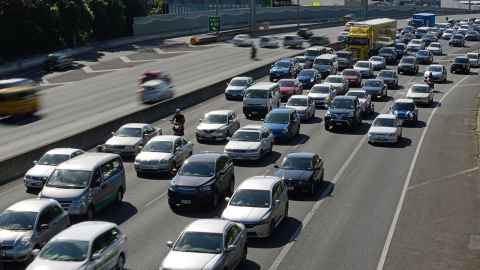What cars and tobacco have in common
3 July 2019
Opinion: Dr Kirsty Wild compares the harms of rising car use to those of smoking and puts forward some suggestions to reduce the time we spend behind the wheel.

Driving has been receiving a lot of bad press recently: from figures just out pointing to increased car use as the source of our growing greenhouse gas emissions, to moves among politicians up and down the country to tackle the rising rate of injury and death on our roads.
Given our increasing awareness of the wide range of social harms caused by our rising car use, it’s time to ask, are cars the new tobacco?
Maybe. They are probably more like the new alcohol: a little bit of use enhances life and heavier use is bad for our health, and tends to destabilise our relationships with our families, our communities and the planet. Of course some people just need cars. But the rest of us should be thinking about how we can reduce our consumption.
Perhaps we need an equivalent of the ‘healthy food pyramid’ for car use? Light car use at the top with a base of walking, cycling and public transport for health? Certainly every time you turn the key, even in an electric car, you produce a whole range of pollutants that we can’t take back. But light car use, the kind that enables you to get your sick kid to the doctor and older and disabled people to stay part of our communities is undoubtedly a social good.
The anxiety and frustration caused by the unpredictability of car travel is one of the hardest things on the body.
So what to do about the rest of it? Well, like tobacco, the health impact of car use hits the heaviest of consumers the hardest. If you are driving in unpredictable, congested conditions, and particularly if you are in the car for 40 minutes plus, you are more likely to struggle with your weight, have higher blood pressure, and you are at an increased risk of heart disease, diabetes, and certain types of cancer. The health impacts of car commuting are worse if you are a woman, and they get worse as you age.
Last year we ran a small trial at Auckland Hospital where we gave motorists a chance to try out an e-bike for a month. I interviewed them afterwards about what it was like to use it, but they mainly wanted to talk about what it was like to get out of a car for a month. They particularly noticed the impact ‘the switch’ had on their mood. Despite living only two or three suburbs out, many of them were leaving in their cars at six in the morning before traffic got heavy. They talked a lot about the stress of the ‘unpredictability’ of their commute and finding parking at the other end. The anxiety and frustration caused by the unpredictability of car travel is one of the hardest things on the body. People who commute by car are the most likely to report finding their commute ‘stressful’ (while those who walk are most likely to find it ‘relaxing’, cyclists to find it ‘exciting’, and public transport users to find it ‘boring’).
Aucklanders now spend nearly a month's worth of work days a year in traffic, and have to add an extra 50 percent on to journey times in order to be on time.
Winston Churchill said ‘we shape our buildings—thereafter they shape us’. This is probably even truer of our neighbourhoods and cities - we are still shaping them in ways that create unhealthy amounts of time in the car. It is not clear who is eventually going to take responsibility for the health impacts of our rising car use. The numbers dropped off a bit last year, but in 2016-17 we had nearly 1000 new cars a week on our roads in Auckland. As a result, Aucklanders now spend nearly a month's worth of work days a year in traffic, and have to add an extra 50 percent on to journey times in order to be on time.
These statistics have a personal cost. Apart from the stress and lack of exercise, people who spend lots of time in the car tend to be less healthy because they have less time for leisure, sleep, spending time with their families, and for eating properly. People with longer journeys take more sick leave, and rate their own health more negatively. Long commutes also have a negative effect on family life, and are associated with higher levels of partner separation.
Cars are probably not the new tobacco: some use is likely to remain important to us, especially while alternatives are still pretty embryonic in New Zealand. But with both car use, and the number of cars on our roads increasing rapidly, we need to start having better conversations about how much time in the car each day our bodies and our planet can sustain.
Dr Kirsty Wild is a research fellow for the School of Population Health, Faculty of Medical and Health Sciences.
This article reflects the opinion of the author and not necessarily the views of the University of Auckland.
Used with permission from Newsroom What cars and tobacco have in common on 3 July 2019.